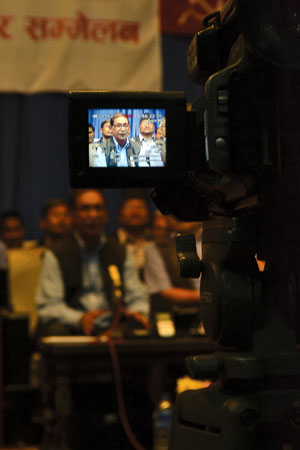National and international political constellations are all in favour of November polls

OUMAIMA GANNOUNI
In the muddled political landscape of Nepal, dissenting voices, no matter how feeble, project themselves into the headlines. For a democracy grappling with transition, the country has been exceptionally tolerant, even towards undemocratic and unconstitutional demands made from the streets.
From the far-right, demanding that country rolls back to a Hindu fiefdom to the ultra-left, vowing to unleash another Armageddon, the interim political order has provided space for all kinds of agonists. But the country cannot afford to get perennially stuck in this interim quicksand. The fundamentals of this new republic must be institutionalised through a statute drafted by a representative body ASAP.
Presently, the country’s political equation is delicately balanced with parties on opposite sides of the ideological spectrum, which is what makes consensual politics so difficult. There is no functioning legislative body and the existing interim government was formed as a result of unwilling compromise among major political parties. It also derives its legitimacy from the same loosely defined political consensus.
So, the decision by the interim electoral government, led by Chief Justice Khil Raj Regmi, to announce CA elections for 19 November must be seen in the same light. There may be no constitutional basis to the claim, but in any democratic society, an election is the most democratic choice. There may be apathy in the general mood of the country, but people who have remained without representation for over a year wouldn’t mind elections if the polls put Nepal back on track.
As good neighbours, both India and China have pledged their support for elections. The Chinese State Councillor Yang Jiechi, who was in Kathmandu in June, and the Indian External Affairs Minister Salman Khurshid who made a day-long stop on 9 July met leaders from all political parties. They engaged more with some, but conveyed near identical messages.
Everybody isn’t exactly warming up to the idea of the November polls, however, the few loud men picketing against elections can at best be considered as that jittery lot that is nervous about being judged to their strength, and at worst, be ignored as attention seekers.
Two of these are Mohan Baidya and Upendra Yadav, but both have suddenly started making conciliatory remarks. To read between the lines, as the man who considers himself undisputed champion of Madhesi agenda, Yadav is unhappy with the way Mahanta Thakur and Bijay Gachhadar have overshadowed him. There is a general speculation that Yadav is not among the favourites down south, which is why earlier attempts by Madhesi intellectuals and civil society to bring him together with Thakur did not succeed.
Besides, the fact that their stance on the Madhes isn’t too far apart proves that the differences lie elsewhere. So, the much talked about unity among Tarai politicians, whether or not it includes Upendra Yadav, will not just be about the Madhes.
Mohan Baidya’s CPN-M seems the more disoriented. Surrounded by comrades in deep sulks like CP Gajurel and Pampha Bhusal, Baidya has a tough job confronting their inflated egos and bringing them around on the issue of elections.
The party does not have a large enough support base to upset the polls as it claims and will end up as a fringe party if it contests elections on its own. But Baidya knows the opportunity cost of not contesting is much higher. So, even if he missed Salman Khurshid’s message in Kathmandu, he probably got the Chinese version of it in Beijing with an extra bit of advice on the strength of re-unity.
If he is not foolish enough to reject the polls, Baidya will have limited choice of either seeking a broader alliance with the UCPN (M) or going for the party unity.
Pushpa Kamal Dahal, for his part, has never lashed out at his mentor for splitting the party because he always knew that the honeymoon with the Madhesi parties weren’t going to last forever. He will politely welcome Baidya & Co back in the party, not because he wants to, but because he needs to.